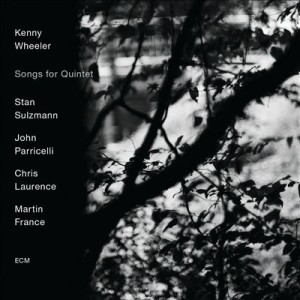 This quintet album represents the last ensemble sessions the American expat flugelhornist Kenny Wheeler played, and it’s a quietly powerful date. I was unfamiliar with Wheeler before hearing this elegiac ECM release, and it’s my loss. I hope to go back and catch up on some of the Canadian composer and horn player’s earlier work, which includes a lot of rock, free jazz, the chamber jazz Azimuth trio, and post-bop small ensembles with top players such as Keith Jarrett, Bill Frisell, Dave Holland and Lee Konitz, among many others. He lived and worked in England since 1952, and died in late 2014; he would’ve turned 85 around the time this record was released.
This quintet album represents the last ensemble sessions the American expat flugelhornist Kenny Wheeler played, and it’s a quietly powerful date. I was unfamiliar with Wheeler before hearing this elegiac ECM release, and it’s my loss. I hope to go back and catch up on some of the Canadian composer and horn player’s earlier work, which includes a lot of rock, free jazz, the chamber jazz Azimuth trio, and post-bop small ensembles with top players such as Keith Jarrett, Bill Frisell, Dave Holland and Lee Konitz, among many others. He lived and worked in England since 1952, and died in late 2014; he would’ve turned 85 around the time this record was released.
This quintet features the rhythm section of Chris Laurence on bass and Martin France on drums plus John Paricelli on guitar; out front with Wheeler is Stan Sulzmann on tenor. It’s no accident that trumpet and tenor saxophone front so many ensembles; their timbres complement each other in ways that create a sound that’s often greater than the sum of its parts. The substitution of flugelhorn for trumpet ups the ante in interesting ways through a variety of different colors and textures.
Those colors and textures are immediately apparent on the opening track “Seventy-Six,” a sweetly melancholy mid-tempo tune. Whether playing in unison, harmony or counterpart, the sounds created by Wheeler and Sulzmann are truly wonderous.
It’s apparent that Wheeler lacked power at times on this date, but it doesn’t stop him from brave sonic exploration. On “Jigsaw,” an aptly named angular composition in which disparate pieces fit and flow together in unexpected ways, Wheeler’s solo floats above and just behind the proceedings as the rhythm session pushes it along. Everybody contributes to this one, Sulzmann using his solo to goad the rhythm section, Parricelli vamping into a fluid solo and Laurence taking a brief excursion before the horns return for a stirring unison coda.
The highlights are “Canter No. 1,” with nice interplay between Laurence’s rhythmic phrasing and Wheeler’s melody, and the way Sulzmann pushes it into a brief lope from the canter; the way the catchily melodic tango of “Sly Eyes” slides easily between moods romantic, mysterious and martial; and the airy “Pretty Liddle Waltz” with its hypnotic four-note motif. Not to be overlooked, though, are the minimalist melancholy ballad “The Long Waiting,” “Old Time,” which you can hear on the ECM website, and the final track “Nonetheless” with its loungey vibe and bossa beat over which the horns and guitar all explore the piece’s deep harmonic and textural potentials.
“Sad music makes me feel happy,” Wheeler is quoted as saying in the ECM one-sheet. He speaks for a lot of jazz players and fans. There’s a lot to feel happy about on Songs for Quintet, a stirring final testament.
(ECM, 2015)
